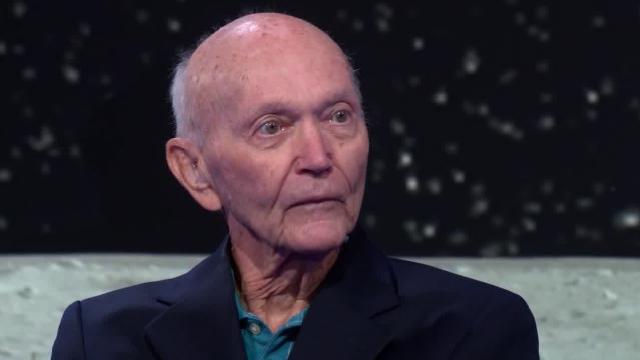Apollo 11 astronaut Michael Collins has died at age 90
Michael Collins, the NASA astronaut who was the command module pilot for the Apollo 11 mission to the moon, has died at age 90 after battling cancer.
His family shared the news Wednesday after his passing on Collins' Facebook page.
"We regret to share that our beloved father and grandfather passed away today, after a valiant battle with cancer," the statement read.
"He spent his final days peacefully, with his family by his side. Mike always faced the challenges of life with grace and humility, and faced this, his final challenge, in the same way. We will miss him terribly. Yet we also know how lucky Mike felt to have lived the life he did. We will honor his wish for us to celebrate, not mourn, that life. Please join us in fondly and joyfully remembering his sharp wit, his quiet sense of purpose, and his wise perspective, gained both from looking back at Earth from the vantage of space and gazing across calm waters from the deck of his fishing boat. Our family asks for privacy during this difficult time. Details on services will be forthcoming."
NASA, where Collins spent seven years of his career as an astronaut, also released a statement about Collins' passing.
"Today the nation lost a true pioneer and lifelong advocate for exploration in astronaut Michael Collins," said acting NASA Administrator Steve Jurczyk in a statement. "As pilot of the Apollo 11 command module -- some called him 'the loneliest man in history' -- while his colleagues walked on the Moon for the first time, he helped our nation achieve a defining milestone. He also distinguished himself in the Gemini Program and as an Air Force pilot.
"Michael remained a tireless promoter of space. 'Exploration is not a choice, really, it's an imperative,' he said. Intensely thoughtful about his experience in orbit, he added, 'What would be worth recording is what kind of civilization we Earthlings created and whether or not we ventured out into other parts of the galaxy.'
"His own signature accomplishments, his writings about his experiences, and his leadership of the National Air and Space Museum helped gain wide exposure for the work of all the men and women who have helped our nation push itself to greatness in aviation and space. There is no doubt he inspired a new generation of scientists, engineers, test pilots, and astronauts.
"NASA mourns the loss of this accomplished pilot and astronaut, a friend of all who seek to push the envelope of human potential. Whether his work was behind the scenes or on full view, his legacy will always be as one of the leaders who took America's first steps into the cosmos. And his spirit will go with us as we venture toward farther horizons."
Edwin "Buzz" Aldrin, former NASA astronaut and lunar module pilot of the Apollo 11 mission, shared his sadness at Collins' passing.
"Dear Mike, Wherever you have been or will be, you will always have the Fire to Carry us deftly to new heights and to the future. We will miss you. May you Rest In Peace. #Apollo11," Aldrin wrote on Facebook.
Collins was born in Italy, became an Air Force pilot, then an astronaut in the Gemini program. He was the third American to perform a spacewalk, according to NASA. Including the Apollo 11 mission, Collins logged 266 hours in space, NASA said.
In 2019, Collins sat down with CNN Chief Medical Correspondent Dr. Sanjay Gupta to reflect on the 50th anniversary of the historic Apollo 11 mission.
Collins reminisced about looking up a the sky as a child, seeing "the most marvelous things up there" and wanting to know more about them, he told Gupta. That's when he knew that he wanted to fly.
Collins came from a military family. His father and brother were US Army generals, and his uncle was the Army chief of staff. He decided to "sneak off" to the US Air Force instead.
In 1961, Collins was a student at the US Air Force Test Pilot School at Edwards Air Force Base in California. That year, President John F. Kennedy said that the United States would put a man on the moon by the end of the decade and return him safely to Earth, Collins remembered vividly.
Collins and about 80% of his peers were "gung-ho," he recalled. NASA and the idea of the Mercury and Gemini programs, which set up for the Apollo program, were attractive, and the space program seemed like a promotion. The other 20% would rather fly and test new airplanes for the Air Force rather than getting "locked up in a capsule and shot off like a round of ammunition," Collins said.
Michael Collins, the NASA astronaut who was the command module pilot for the Apollo 11 mission to the moon, died on April 28 after battling cancer, according to a statement released by his family. He was 90.

